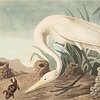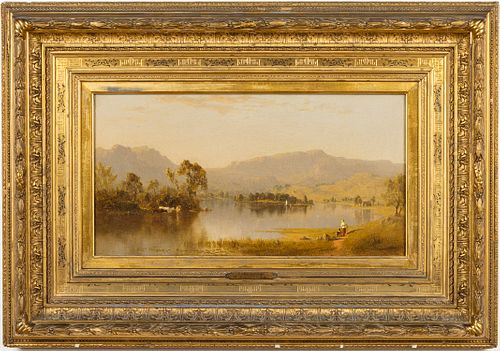Sanford Robinson Gifford, Hudson River Scenery, Oil
Bid Increments
| Price | Bid Increment |
|---|---|
| $0 | $10 |
| $100 | $25 |
| $500 | $50 |
| $1,000 | $100 |
| $3,000 | $250 |
| $5,000 | $500 |
| $10,000 | $1,000 |
| $30,000 | $2,500 |
| $100,000 | $5,000 |
| $300,000 | $10,000 |
Property from a Bluffton, SC Private Collection
Description:
Sanford Robinson Gifford (American, 1823-1880) , Hudson River Scenery, Oil on Canvas on Board, signed 'S. R. Gifford, 1858', lower right corner, framed: 22 in. x 31 3/8 in. Provenance: Inherited in the mid 1940's from a American art collector in NJ, then by descent to current owner. We wish to thank Dr. Ila Weiss, the leading Sanford Robinson Gifford scholar, for preparing the following essay which accompanies the lot: "It was a surprise and especially delightful for me to encounter this painting as I have been intimately familiar with a half size oil study for it for many years and had no idea until now that it existed.
A comparison of both versions of this landscape not only firmly identifies the artist, but provides a vivid example of Gifford’s typical development of a concept. It also raises the question of the identification of the subject, as the oil on paper, mounted on canvas study, 5 ¼ by 10 ¼ inches (stretcher), bears a Gifford Sale stamp on the verso that points to its identification as #54 in the Catalogue Part II of the Gifford Collection (New York: Thomas E. Kirby, Auctioneers, 1881), where it is titled, “Hudson River Scenery.” [Color Plate 7 in my book, Poetic Landscape: The Art and Experience of Sanford R. Gifford (1987).] The oil study was initialed “S R G” in the lower right, probably by Gifford’s close friend, the artist Jervis McEntee, who completed sketches remaining in Gifford’s studio after his death for the Gifford estate sale. No other Sale Catalogue listing is possible for this work. In the Gifford Memorial Catalogue (New York: Metropolitan Museum of Art, 1881) the smaller version is given as #472, “A Sketch of Hudson River Scenery.” None of its listings may be identified with the larger painting: it was evidently not known at the time of Gifford’s death.
To pursue the frame title, I have thoroughly searched all the known drawings and paintings by Gifford of Lake George subjects and find nothing that can be connected to your painting. It is likely that at the time of framing the view reminded its owner of Lake George scenery; but it is also conceivable that there was documentation of that title at that time, now lost—perhaps an inscription on the canvas verso by the artist, not recorded in relining. (It may be possible to reveal such an inscription by x ray photography; you may want to pursue this with a restorer.) The Hudson River identification of the smaller version would probably have been made by McEntee, possibly based on his familiarity with the scenery or even knowledge of the circumstances of the painting’s creation. Gifford usually began with pencil drawings of a view, especially its distance, sometimes along with foreground elements and ideas for compositions, but none have been found preliminary to these paintings. There may have been other small oil sketches and studies, also lost.
The smaller oil study establishes all the main elements of the view in your painting. Two mountains occupy the distance beyond water, veiled in luminous haze. Their intersection, left of center, is accented by a far-foreground tree, its droopy form often seen in Gifford paintings of this period. Adjacent woods extend to the left edge. A more distant wooded land mass, probably an island or possibly a peninsula, just right of center, is offset by a grayed-white sail with adjacent red and white dots indicating figures. All are picturesquely doubled in reflection. A right-foreground shoreline, edged in marshy grass (which may have signaled the Hudson), completes the study’s composition. Subtle changes in developing the idea, typical of Gifford, reveal his thinking. The larger version, slightly less panoramic in format, somewhat enlarges areas of sky, mountains, foreground and water, and, with adjustments of tone increases the aereality of the distance to provide an effect of greater expanse and depth, implying taller, more imposing mountains. Refinements of the mountain contours add further interest to the distance. Both versions contain the sailboat with its figures and a farmhouse at the edge of the water in the right middle-distance—both clarified in the larger painting—that define the contemporary moment. Two changes in the larger work are significant: a rock in the foreground of the study is replaced by the figure of a woman carrying a basket, dressed in a white top, blue belt, red skirt and yellow head covering, walking with a black and white spotted dog on a path toward the house. The same dog climbed Mount Mansfield with Gifford and fellow campers that summer, as recorded in paint—probably the artist’s own pet. Several paintings by Gifford dating from the mid-Fifties to the early-Sixties have comparable figures. Closest to that in your painting appears on a riverside path in a view of Windsor Castle: a woman carrying a basket and wearing a yellow head covering, white top and red skirt. Also, in the left middle distance of your painting three cows are introduced, reddish-brown, white, and gray-tan, sculpted by sunlight against the dark woods, posing in three different positions while grazing in the reflective water. Similar cows in water appear in quite a few paintings by Gifford during this period. The figure and the cows not only add pops of color lacking in the smaller study; they underscore the idea of a semi-domesticated American wilderness.
The most significant change between the study and your developed image is the effect of warmly tinted aerial-luminosity, a Gifford stylistic hallmark. The oil study has a cool, subdued green–blue unity, with dark greens, near-blacks, and olives in the nearest woods and a cooler middle distance. Its distant mountains are grayed blue–green in shadows, with warmer grayed-olive highlights suggesting their veiled forms. In this smaller version the deep pink of near-sunset light is concentrated at the horizon toward the left, whereas in your painting the warmth of the sky is diffused almost to the top edge where it stains more prominent clouds reaching across the breadth of the painting, sounding the color keynote. Such a late afternoon effect of tinted air, established with adjusted tonal contrast, warmer colors and pink glazing, frequently characterizes Gifford’s work of this period. The left far–foreground trees are now lighter in tone and warmer in hue than in the oil study, brown to olive-green with pale yellow-olive, with visually enticing yellow-white highlights striking tree trunks and limbs, and warm light illuminating yellowish birch leaves—a Gifford hallmark, strikingly developed in the Metropolitan Museum’s Kauterskill Clove in the Catskills of 1862. As transformed by the pink haze, the right middle-distance is now constructed of lighter olives and gray browns; the mountain distance, a pale mix of cool gray and pink, is half lost in the colored light. The veiling effect of warm, late afternoon light suffusing the landscape not only unifies the image but conveys sentiment: the artist’s deep affection for characteristic American scenery on return home from his first trip abroad of 1855–1857.
As to the title, neither Lake George nor Hudson River Scenery is secure, but I prefer the latter which was determined by someone close to the artist during his lifetime and published—unless an inscription in the artist’s hand or other firm evidence to the contrary can be documented."
Sanford Robinson Gifford was an American painter and prominent member of the second generation of the Hudson River School artists. Gifford attended Brown University, though he never graduated, before moving to New York City to study painting under John Rubens Smith. He was initially trained as a portraitist, but quickly turned to his preferred subject of landscape painting. He first exhibited at the National Academy of Design in 1847 and became a member in 1850. Travels across Europe allowed Gifford to study and copy from the master's whose works he had long admired, most notably that of JMW Turner. His mastery of soft atmospheric effects and emphasis on light made him one of the most highly regarded Luminists. Gifford's work can now be found in the permanent collections of the Metropolitan Museum of Art, the National Gallery of Art, the Philadelphia Museum of Art, the Cleveland Museum of art and many more, as well as in various other public institutions and private collections.
Measurements: Height: of board 10 3/4 in. x Width: 19 15/16 in.
Condition:
Good restored condition, please email us, info@everard.com for a link to high resolution image gallery, the original canvas trimmed to the outer edges of the painting and wax lined to an aluminum honeycomb board. Original canvas measures 10 1/2 in x 19 7/8 in. but has been extended to 10 3/4 in. x 19 15/16 in. with inpainting. Signature and date are faint (please see photos, we have enhanced 2nd photo of signature to make it legible), craquelure throughout, inpainting particularly to sky, outer edges and scattered other areas, see blacklight photo. Restoration originally done by well regarded paintings conservator Bernard Rabin (1916-2003) in 1972 and Sidney Mickelson, Mickelson's Inc., Washington D.C. in 1997. Frame with small losses and age cracks throughout.
Notice to bidders: The absence of a condition report does not imply that the lot is in perfect condition or completely free from wear and tear, imperfections, or the conditions of aging. Complete condition reports are available by request, no later than 24 hours prior to the live auction. All lots are offered and sold 'as is', and Everard Auctions will not provide refunds based on condition. Timepiece movements, lighting and electrics have not been tested, and art has not been examined out of the frame unless otherwise stated. We do not guarantee the condition of frames. By placing a bid, either in person, by phone, absentee or via the Internet, you signify that you agree to be bound by the conditions of sale. Everard Auctions does not provide any shipping or packing services. We recommend that all potential buyers obtain pack/ship estimates prior to bidding. Please contact us for a list of recommended shippers.
Available payment options
PAYMENTS. Payments are expected within 7 calendar days of receiving your invoice. You will pay us the total purchase price for a lot by credit card (UP TO $5,000), cash (US currency not to exceed $10,000 in a single or multiple related payments), check, or wire transfer, before the property can be removed. Everard Auctions and Appraisals requires payment by wire transfer, check, ACH or cash (up to $10,000) for jewelry, watches and precious metals for all New and/or International buyers. You must quote your invoice number when making a payment. A Convenience Fee of approximately 3% will be applied to all US credit card payments, and non US credit cards approximately 4%. No fee will be levied if payment is made by Cash or Check. Please note a flat $15 fee for wire transfers should be included in the amount wired. For all payments made by check, we reserve the right to hold the merchandise for 7 Business days or until cleared or certified funds are provided. The purchaser will be charged $35.00 for each check returned for insufficient funds. Additionally, all payments made after 30 days will be subject to a 1.5% Late Payment Fee which will continue to accrue and compound per each additional 30 day period.
Buyer Pays Shipping Cost. We recommend that all potential buyers obtain pack/ship estimates prior to bidding. EVERARD AUCTIONS DOES NOT MAINTAIN AN IN-HOUSE SHIPPING DEPARTMENT OR PROVIDE PACK/SHIP QUOTES. For pack/ship quotes on smaller items, we suggest contacting Mike at The UPS Store (tel: 912.604.1682, email: tupss1206@gmail.com ). You may, of course, use any shipper of your choosing. For quotes on larger items please contact Westbrook Moving quotes@westbrookcorp.com or Plycon jjuliano@plyconvanlines.com providing: Pickup city/state Deliver to city/state Description of piece(s) Lot # and date of auction Size of each piece(s) in inches: height/width/depth Picture of the piece(s) if possible Anything fragile associated with item: marble, glass, mirror, lacquer finish, velvet/mohair fabric etc. Value to declare for each or all items Any special assembly needs or flight carry needs at delivery INTERNATIONAL SHIPPING: Please contact info@everard.com for international shipping quotes BEFORE bidding. Please be advised that international shipping can be costly.




























